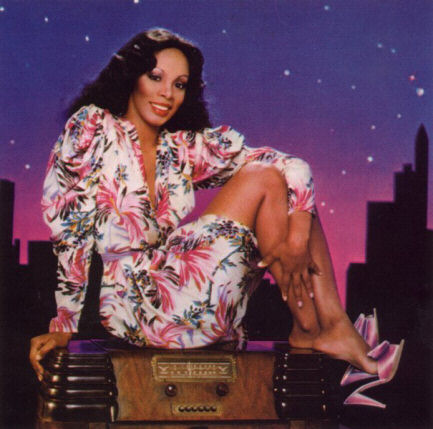 This Is Not A
BLOG!
This Is Not A
BLOG!
Date: 17/05/12
A Diva Departs

Donna Summer (LaDonna Adrian Gaines)
Singer, songwriter
b. 31 December 1948, d. 17 May 2012
It's getting to be quite a depressing yet inevitable phenomenon;
the deaths of people who played some prominent part in your growing up.
I was thirteen when Donna Summer first impinged upon my
consciousness, with the release of Love To Love You Baby. The
sound of a woman - obviously a very sexy and sensual woman - faking
orgasms over a slightly cheesy soundtrack was alluring almost to the
point of being disturbing for a gently-nurtured adolescent. The BBC
refused to play the track, but the commercial stations I was listening
to at the time had fewer qualms about airing it, at least late at
night, which was when I tended to listen to them.
She then followed it up with a similarly climactic rendition of
Barry Manilow's Could It Be Magic (both tracks were to cause a
certain degree of embarrassment to her later, when she became a
born-again). But then it went a bit quiet, until the release of her
1977 album I Remember Yesterday.
This was that thing much dreaded by music lovers in the seventies;
a concept album. Or at least the first side was, recreating as it did
the musical styles of the forties, fifties and sixties with a
by-then-standard orchestral disco backing.
But it was the last track on the LP (that means 'Long Player',
kids: a piece of black plastic twelve inches across with a hole in the
middle; ask yer granny) which made such a huge impact. Indeed, it was
what would now be called (by people with no sense of shame and Van
Gogh's ear for language) a 'game changer'.
There had been electronic music in the charts long before. I had
some of it; Hot Butter's recording of Gershon Kingsley's Popcorn
and Kraftwerk's astounding Autobahn for two. But it was still
regarded as a novelty. Disco too had been around for a couple of years
or more, although it could be characterised mostly as a form of light
soul set to bombastic orchestral backing.
There were other hindrances; 'real' musicians didn't regard those
who worked with synths and the like as being themselves 'real'
musicians, an attitude which was so prevalent that the Musicians' Union
in the UK actually tried to get electronic instruments banned from use
altogether, fearing that it would yank the crusts out of the mouths of
its members (a position which seems ludicrous today, until you remember
that that's exactly the position taken by the whole of the
entertainment biz in connection with the internet).
Donna Summer - working once again in partnership with producers
Giorgio Moroder and Pete Bellotte (who had also been involved with
Chicory Tip's hits a few years previously) - changed all that in less
than six minutes of playing time.
I Feel Love was entirely electronic, with programmer Robbie
Wedel getting a Moog to do things even Bob Moog didn't know it was
capable of doing, most particularly with the ability to synchronise
synth lines with each other by referencing each of them with a pulse
signal on one of the tracks. The strong rhythm and arpeggiated bass
line which resulted was just raw dance energy. With Summer's
multitracked vocal over the top of it, what was regarded even by its
producers as just a filler at the end of the album - a little glimpse
at a possible future - became an all-time solid-platinum classic,
reaching No.1 in the UK. It also had a pioneering 12" mix and has been
remixed almost to banality ever since.
Summer later went on to do more conventional material - such as
covers of Jimmy Webb's over-the-top-and-the-best-of-luck Macarthur
Park, and Jon & Vangelis' State Of Independence
(although this latter was strongly electronic) - and never fully
recaptured the impact of I Feel Love. But her voice was special
and distinctive, and her presence strong. A true diva.



 This Is Not A
BLOG!
This Is Not A
BLOG!











